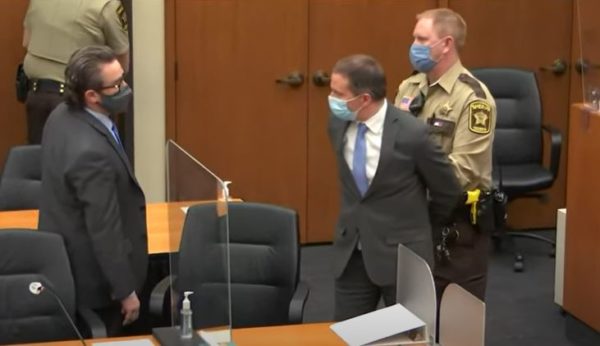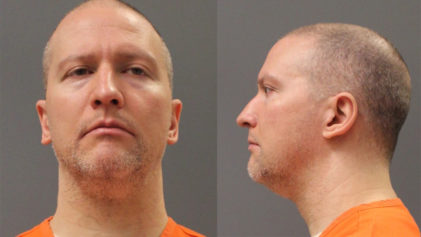Former Minneapolis police officer Derek Chauvin was convicted Tuesday of murder and manslaughter for killing George Floyd.
Chauvin faces up to 40 years in prison and is expected to be sentenced in eight weeks.
A jury found him guilty of all three charges he faced following 14 days of testimony over the course of three weeks. Their verdict culminated a landmark trial that commanded attention across the globe.
Chauvin, 45, was handcuffed after the verdict was read and led out of the courtroom by a Hennepin County bailiff.

Chauvin became an emblem of problematic policing following a May 25, 2020, encounter that triggered months of unrest. Chauvin kneeled on Floyd’s neck for 9 minutes, 29 seconds as he and two other officers restrained him during a forgery arrest. Floyd, a 46-year-old father of five, died of cardiopulmonary arrest under the weight of the three officers pressing him against the concrete pavement.
“George Floyd’s final words on May 25, 2020 were ‘Please, I can’t breathe,’” Steven Schleicher, a special prosecutor in the case, told jurors during closing arguments of the trial Monday morning. “He said those words to…the defendant. He asked for help to his very last breath. But ‘Mr. Officer’ did not help. He stayed on top of him, continued to push him down, to grind his knees, to twist his hands and twist his fingers into the handcuffs that bound him.”
Thomas Lane, J. Alexander Kueng, and Tou Thao, the three other ex-officers involved, face charges of aiding and abetting second-degree murder and manslaughter. They are scheduled to be tried in August.
A jury of two white men, four white women, three Black men, a Black woman and two multiracial women decided the verdict. Jurors deliberated for four hours Monday and reconvened Tuesday morning, hashing out the case for another six hours before reaching their decision around 3:30 p.m. Eastern Time Tuesday.
Chauvin was tried for second- and third-degree murder charges as well as second-degree manslaughter stemming from Floyd’s death. The convictions could carry 40-, 25- and 10-year prison sentences, respectively.
Chauvin showed no emotion as the verdict was read, his face partially covered with a surgical mask. Peter A. Cahill, the judge presiding over the case, ordered a pre-sentencing investigation and set a hearing in six weeks to be briefed on the PSI. He said Chauvin will be sentenced in eight weeks.
President Joe Biden weighed in from the Oval Office on Tuesday, telling reporters he called Floyd’s family to express support after the jury was sequestered Monday, according to The New York Times. He noted that the family was calling for “peace and tranquility no matter what that verdict is.” The president seemed to favor a conviction, but stopped short of explicitly throwing his support behind a decision.
“I’m praying the verdict is the right verdict, which is — I think it’s overwhelming in my view,” Biden said.
Biden was not the only high-ranking Democratic leader who weighed in on the verdict this week. Longtime U.S. congresswoman Maxine Waters (D-Calif.) came under fire after she spoke to protesters in Brooklyn Center, Minnesota, on Sunday. Waters told reporters, “We’ve got to get more confrontational,” when asked about the possibility of Chauvin being acquitted.
Her remarks were drew a stern rebuke from Cahill after Chauvin’s attorney Eric Nelson motioned for a mistrial based on what he characterized as a threat to jurors and a call for violence.
“I wish elected officials would stop talking about this case, especially in a manner that is disrespectful to the rule of law and to the judicial branch and our function,” Cahill said before denying Nelson’s motion. “I think if they want to give their opinions, they should do so in a respectful (way) and in a manner that is consistent with their oath to the constitution. To respect the co-equal branch of government. Their failure to do so, I think, is abhorrent.”
Schleicher took note of Chauvin’s body language, staring down the crowd of bystanders with his hands in his pockets as he knelt on Floyd’s throat. He boiled Chauvin’s motivation for the killing down to pride, saying the ex-officer felt his authority was being challenged and he abused his power.
“The defendant was not going to be told what to do,” Schleicher said. “He was not going to let these bystanders tell him what to do. He was going to do what he wanted, how he wanted, for as long as he wanted, and there was nothing, nothing they could do about it because he had the authority.”
Nelson argued that Floyd died from sudden cardiac arrhythmia, a heart condition that causes an irregular heartbeat. He suggested it was onset by the combination of methamphetamines and Fentanyl in Floyd’s system, inhaling exhaust fumes from the squad car’s tailpipe, and pre-existing medical conditions.
But prosecutors said Floyd died of asphyxia — lack of oxygen. Schleicher said “it was like he was squeezed in a vise” and gasping for shallow breaths through a straw.
World-renowned pulmonologist Dr. Martin Tobin testified that the sustained pressure atop Floyd had the effect of his lung being surgically removed. Schleicher said Chauvin mocked Floyd as he deteriorated over several minutes and showed a “conscientious indifference” to Floyd’s fight for life.
“This wasn’t policing, this was murder and the defendant is guilty,” he said.


